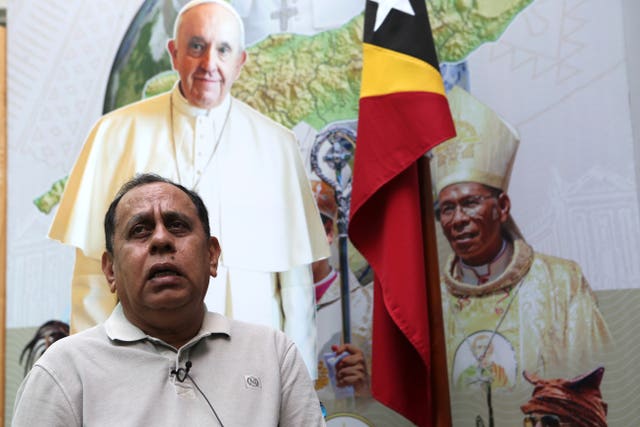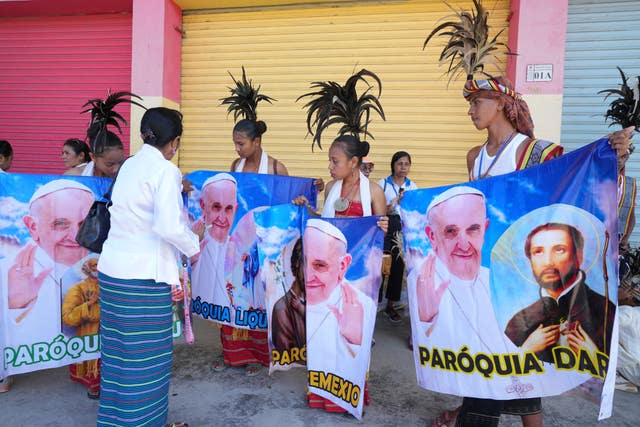East Timor pulled out all stops for Pope Francis’ historic visit to one of the world’s youngest and poorest countries to the tune of 12 million dollars (£9.1 million), drawing rebuke from activists and human rights organisations.
The cost of the two-day visit, which started on Monday, was approved by the government through the Council of Ministers in February, including one million dollars (£762,000) to build an altar for a papal mass.
Walls were still being dabbed with fresh paint and banners and billboards filled the streets of the seaside capital Dili to welcome the pontiff.

About 42% of East Timor’s population of 1.3 million live below the poverty line, according to the UN Development Programme.
The country’s budget for 2023 was 3.16 billion dollars (£2.4 billion).
The government had earmarked only 4.7 million dollars (£3.5 million) to increase food production, said Marino Fereira, a researcher at Timor Leste Institute for Development Monitoring and Analysis. He said the reported expense for the papal visit “was exaggerating.”
The non-governmental agency, known locally as Lao Hamutuk, has submitted several papers to the government and parliament asking to cut expenditures on ceremonies and prioritise issues that affect people, Mr Fereira said.
“The governments have ignored the poor in the country,” he said.
East Timor has faced challenges of high inflation and weather changes that have reduced cereal production, pushing some 364,000 people, or 27% of the population, to experience acute food insecurity from May to September, according to the UN’s Food and Agricultural Organisation.
East Timor’s Minister of State Administration Tomas Cabral, who heads the national organising committee for the pope’s visit, said the 12 million dollars (£9.1 million) was excessive, but was also being used for infrastructure development, such as road construction, renovating churches and other public facilities.

“Don’t compare our country with neighbouring nations that have proper facilities and infrastructure to host international events or high-ranking state guests,“ Mr Cabral said.
Cabral said that about 1.2 million dollars (£913,680) has been allocated for transportation and logistics of people from across the country to welcome the pontiff and attend his mass on Tuesday.
East Timor views the visit as a prime opportunity to put the world’s spotlight on the small nation with a turbulent path to independence.
“The pope’s visit is the biggest, the best marketing anyone can aspire to promote the country, to put the country on the tourist map,” East Timor’s President Jose Ramos-Horta said in an interview with The Associated Press last week.
The highlight of the visit will be a Eucharistic celebration on Tuesday where more than 300,000 faithful are expected, including several thousands living near the border of Indonesia’s West Timor, the western part of the island of Timor.
The papal mass in Tasitolu, an open field on the coast five miles from downtown Dili, is also causing displeasure. The government has bulldozed about 185 families and confiscated 23 hectares (57 acres) of land for the event. Rights groups accuse the government of not offering any alternatives to poor families.
“The lives of those families are uncertain at the moment, they don’t know where to go as they are still there waiting for compensation,” said Pedrito Vieira, coordinator of the Land Network, a coalition of NGOs advocating land rights. “Sudden eviction will only give them uncertainty to plan their life.”
I am happy to have spent these past few days in #PapuaNewGuinea, where the sea, mountains and tropical forests coexist. It is, above all, a young country inhabited by many young people! I bless you and accompany you with my prayers. #ApostolicJourney
— Pope Francis (@Pontifex) September 9, 2024
Mr Cabral said those were settlers and not traditional landowners who were squatting on state land. He said they were given advance notices and time to remove their structures and move out.
“There have been those who have politicised the situation there so that the illegal settlers have refused to move for unclear reasons,” Mr Cabral said.
Several violent crackdowns on street vendors ostensibly to ensure order in Dili ahead of the Pope’s trip also drew outcry among rights activists.
Social media was flooded with angry comments after footage showed dozens of alleged plainclothes police officers with sticks, crowbars and spears destroying vendor stands and goods in one of the paths where the pope’s entourage will pass.
Suzana Cardoso, a veteran journalist who recorded the incident last week in Dili’s Fatuhada neighbourhood, told The Associated Press that she received threats in an attempt to stop her from sharing the video.




Comments: Our rules
We want our comments to be a lively and valuable part of our community - a place where readers can debate and engage with the most important local issues. The ability to comment on our stories is a privilege, not a right, however, and that privilege may be withdrawn if it is abused or misused.
Please report any comments that break our rules.
Read the rules hereLast Updated:
Report this comment Cancel